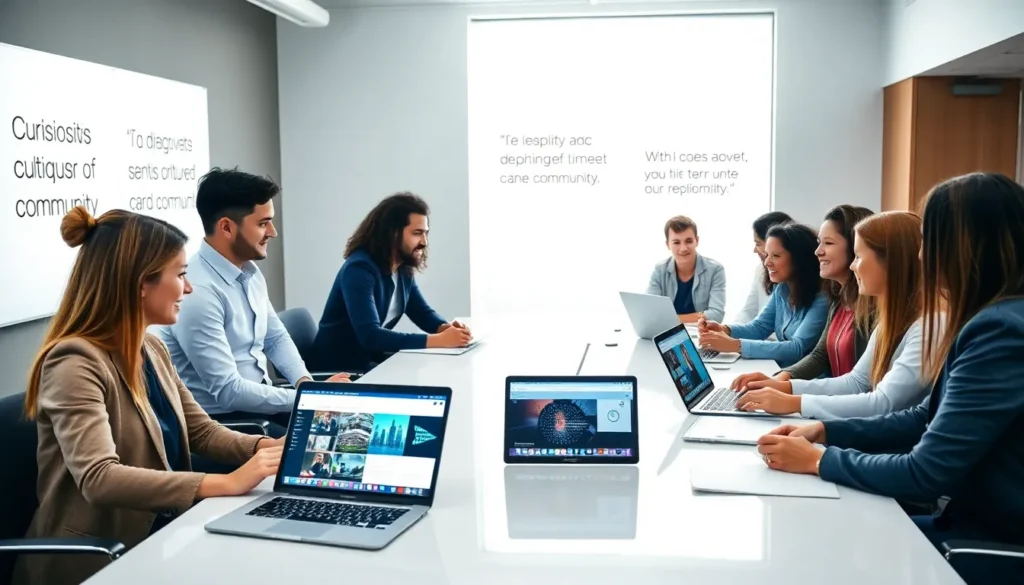In today’s fast-paced world, college life can feel like a juggling act with textbooks, assignments, and social events flying around like confetti at a graduation party. Enter mobile apps for colleges—your new best friends in navigating the academic jungle. These handy tools don’t just help students stay organized; they turn chaos into a well-orchestrated symphony of productivity.
Imagine having all your class schedules, grades, and campus events just a tap away. It’s like having a personal assistant in your pocket, minus the awkward small talk. Whether it’s managing study groups or finding the best coffee on campus, mobile apps are here to make college life not just manageable but downright enjoyable. With the right app, students can focus on what really matters—like perfecting their late-night pizza order.
Table of Contents
ToggleOverview of Mobile Apps for Colleges
Mobile apps serve as vital resources for college students, addressing various academic and social needs. These applications enhance organization by providing tools for time management, class notifications, and assignment deadlines. Calendar apps categorize important dates, while to-do list applications help prioritize tasks based on urgency.
Students benefit from communication features found in mobile apps. Group messaging allows collaboration with peers, fostering engagement in group projects or study sessions. Individual and group chats streamline communication between students and instructors, improving accessibility to academic support.
Educational apps deliver interactive learning experiences. Many platforms offer video lectures, quizzes, and flashcards to reinforce course materials. Statistics reveal that students who use educational apps demonstrate higher retention of information compared to those who rely solely on traditional methods.
Campus-specific applications provide essential information about university resources. Features may include campus maps, event calendars, and food service menus. Real-time updates regarding campus safety or traffic alerts ensure that students stay informed about their surroundings.
Mobile apps also promote mental health support through various tools. Mindfulness and meditation applications encourage stress management among students. Highlights include coping strategies and relaxation techniques that contribute to overall well-being.
With these various functionalities, mobile apps greatly enhance the college experience. They empower students to manage their academic lives effectively while maintaining a balanced social life. Accessibility to resources and supportive communities through these platforms transforms the approach to academic challenges.
Benefits of Using Mobile Apps in Higher Education

Mobile apps play a crucial role in enhancing the college experience for students. They offer various functionalities that address both academic and social needs, making college life more manageable.
Enhancing Student Engagement
Increased student engagement results from using mobile apps tailored for college environments. Interactive learning platforms foster participation in discussions and activities. Push notifications encourage students to participate in events and deadlines. Collaborative features enable students to form study groups, share resources, and enhance peer communication. Access to course materials through mobile applications allows students to study on-the-go. Instant feedback mechanisms help assess understanding, making the learning process more effective. Reports indicate that students using such apps show greater investment in their academic journeys.
Streamlining Administrative Processes
Streamlined administrative processes benefit colleges and students alike. Mobile apps simplify access to important information, such as class schedules and grades. Notifications regarding academic deadlines keep students informed and on track. Direct communication with faculty promotes quicker responses to student inquiries. Students can request appointments and track their academic progress with ease. Additionally, mobile apps offer functionalities for payment processing and financial aid information. Reduced administrative burdens empower institutions to allocate resources more effectively. Thus, mobile applications contribute significantly to improving operational efficiency within higher education settings.
Popular Types of Mobile Apps for Colleges
Mobile apps play a crucial role in enhancing the college experience. Various types of applications cater to different aspects of student life, making academic and social demands more manageable.
Learning Management Systems (LMS)
Learning Management Systems serve as centralized platforms for course materials. Students access lectures, assignments, and grades through these apps. They promote interaction between students and instructors, facilitating question-and-answer sessions. These systems streamline learning by enabling submission of assignments and tracking academic progress. Statistics reveal that 70% of students prefer using LMS for their courses, highlighting their effectiveness in managing academic responsibilities.
Campus Communication Tools
Campus communication tools enhance connectivity among students, faculty, and staff. These apps support instant messaging, notifications, and announcements, ensuring everyone stays informed. Users can create group chats for collaborative projects or individual study sessions. Furthermore, real-time updates foster a sense of community on campus. Over 80% of students report improved engagement through these tools, strengthening their academic relationships.
Event Management Applications
Event management applications assist in promoting campus activities and managing schedules. Students find information about upcoming events, including lectures, workshops, and social gatherings. They can RSVP, purchase tickets, and receive reminders through these apps. In addition, these platforms enable organizers to gauge attendance and gather feedback post-event. Data indicates that students who engage with campus events through these apps show a 60% increase in overall satisfaction with their college experience.
Key Features to Look for in College Mobile Apps
Choosing the right mobile app significantly enhances the college experience. Certain features stand out as essential for effective student engagement and support.
User-Friendly Interface
A user-friendly interface simplifies navigation for students. Intuitive design elements lead to quicker access to important information, such as schedules and grades. Clear icons and organized menus minimize confusion, allowing users to find necessary tools effortlessly. Consistent layout across different sections fosters familiarity. Also, mobile apps that support accessibility features cater to diverse user needs, ensuring every student benefits equally.
Integration Capabilities
Integration capabilities play a vital role in maximizing app functionality. Seamless connections with Learning Management Systems, email platforms, and calendar applications improve overall user experience. Students appreciate apps that consolidate various resources into a single location, reducing the time spent switching between multiple tools. Real-time data synchronization ensures accurate updates, enhancing academic tracking and communication. Furthermore, strong integration with campus services enables easy access to dining, library, and event information, streamlining daily activities.
Mobile apps have become indispensable tools for college students navigating the complexities of academic life. By enhancing organization and communication, these applications empower students to focus on their studies while enjoying their social experiences. With features that support learning, collaboration, and mental well-being, mobile apps streamline daily tasks and foster a sense of community within campuses.
As technology continues to evolve, the role of mobile apps in higher education will only grow. By embracing these tools, students can transform their college experience into a more productive and engaging journey. Ultimately, the right mobile app can make all the difference in balancing academic responsibilities and personal growth during this pivotal time.









